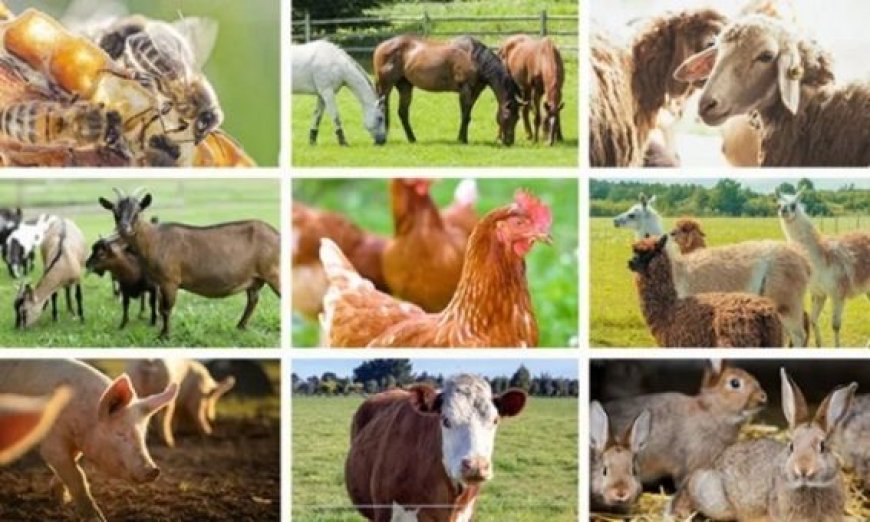Nigeria, Ghana, others position for livestock exports

Nigeria is intensifying efforts to become a global player in livestock exports as part of its wider push to diversify the economy away from oil.
A joint study by the UN Food and Agriculture Organisation (FAO) and the Organisation for Economic Co-operation and Development (OECD) projects that global per capita consumption of animal-source foods will rise by six per cent by 2034, with lower middle-income countries expected to post a dramatic 24 per cent increase.
Analysts said rising global demand for meat and dairy offers Nigeria a chance to unlock a multi-billion-naira export industry while strengthening food security at home.
For the Minister , Federal Ministry of Livestock Development, Idi Mukhtar Maiha, Nigeria, where livestock export potential is estimated at more than N150 billion annually, the opportunity is significant.
Maiha said the Federal Government has introduced the National Livestock Growth Acceleration Strategy (NLGAS), which focuses on feed and fodder development, genetics and breeding, disease control, and the transition of nomadic herders into modern grazing hubs.According to him, more than 400 reserves are scheduled for rehabilitation and will feature renewable energy, schools, clinics, and veterinary services. Grazing reserves and livestock routes nationwide are also being digitised to improve management.vManaging Director, Commodities Development Initiative (CDI), Dr. Roland Oroh, urged greater cooperation between the public and private sectors to eliminate trade barriers, align with international standards, and encourage investment in abattoirs and meat processing facilities.
Speaking at a high-level meeting in Abuja, he highlighted the opportunities Nigeria has in expanding its livestock exports, particularly to the Middle East. Oroh emphasised that Nigeria has considerable potential in exporting key products such as red meat, live animals, fodder, and soya bean meal. He stressed that to fully capitalize on these opportunities, the country must enhance industry standards, improve infrastructure, and create an environment that supports private sector involvement.
Nigeria’s efforts are mirrored at the regional level.
Recently, ECOWAS launched the second phase of the West Africa Livestock Marketing Support Programme (PACBAO) in Accra, Ghana. Backed by $10 million from the Swiss Development Cooperation, the initiative aims to modernise livestock trade, strengthen value chains and increase intra-regional red meat flows by up to 30 per cent over the next three years.
The Government of Ghana has thrown its weight behind PACBAO’s second phase. Minister of Food and Agriculture, Eric Opoku, announced the government’s endorsement during a knowledge-sharing workshop in Accra. He emphasised that PACBAO has already delivered remarkable results in Ghana under its first phase and promised greater commitment to ensuring the success of the second phase. Ghana currently spends around $375 million annually on importing meat to meet domestic demand. This heavy reliance on imports strains foreign exchange reserves and exposes the country to global price fluctuations. “The vision of PACBAO aligns perfectly with the ECOWAS Agricultural Policy,” Minister Opoku noted. “By building on the successes of the first phase, we are confident that Ghana can significantly reduce its import bill while creating jobs and improving food security.”
Beyond West Africa, other countries are also stepping up. Morocco plans to spend 6.2 billion dirhams ($670 million) on a 2025–2026 programme to replenish its livestock herd, which has been reduced following years of prolonged drought. Agriculture Minister Ahmed El Bouari said 3 billion dirhams is allocated this year and 3.2 billion next year for measures including debt relief and restructuring for livestock farmers, as well as feed subsidies. The programme,according to him, also includes aid to farmers who retain breeding female livestock, along with veterinary campaigns, genetic improvement and artificial insemination.
Nigeria, meanwhile, has secured new international market access. At the FirstBank Agric and Export Expo 2025, Niger State Governor Mohammed Umaru Bago announced a $100 million offtake agreement with the Saudi Export and Import Bank to supply livestock to the Middle East, starting with an initial $10 million tranche. The deal,according to him, positions Nigeria to tap into a $2.5 billion market for meat and by-products in the Gulf. “Under the arrangement, Niger State will provide 100,000 hectares of farmland, while Lagos will handle logistics and processing. Rather than trekking animals across the country, livestock will be processed in Niger into frozen, packaged meat and transported using LNG-powered cold-chain trucks supported by Lagos. The model is designed to reduce waste, improve quality, and ensure Nigeria exports value-added products instead of live animals.
Lagos, which consumes nearly two million cattle each year but produces less than one per cent of its needs, is investing heavily in feedlots to boost local output.
A pilot project in Badagry, according to the Commissioner for Agriculture and Food Systems, Ms. Abisola Olusanya, is breeding 500 cows, while 750 hectares in Epe have been earmarked for a large-scale integrated red meat value chain in partnership with Brazilian experts. Olusanya said the initiative would reduce the state’s heavy reliance on supplies from other states.
Nigeria, Ghana, others position for livestock exports - The Nation Newspaper









